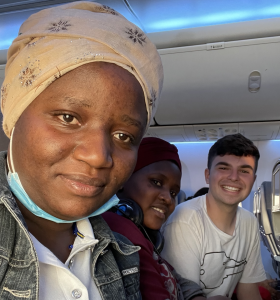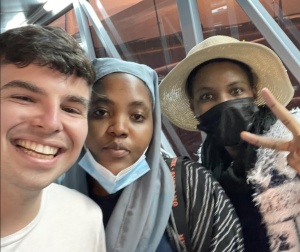While I fly quite frequently, I often find the experience unenjoyable; cramped seats, crying children, and relatively untasteful food don’t add to the experience. However, on my flydubai flight from Dubai to Entebbe, the capital of Uganda, I experienced a memorable flight for all the right reasons; unmatched kindness, laughter, and stories, that will reside in me for a very long time.
Prior to boarding, I struck up conversation with two girls who were sitting next to me at the gate. They were also in their 20’s, Indian-Kenyan friends residing in Uganda due to their families changing business operations. They had both longed for an escape from the chaos of Kampala and had set out on a week-long vacation in Dubai. They expressed their disappointment with flydubai’s business class, the airline losing their baggage, flydubai swapping our airport last minute from Dubai International to the uncompleted Dubai World Central, and the sadness of returning to Kampala which was supposedly inferior to Nairobi. After our quick conversation, we swapped Instagram handles and began the boarding process.
A bus took us from the gate to the plane. After waving goodbye to the two girls as I walked past them in row one, I made my way to my seat in economy. The boarding experience took a turn for the worst when the girl sitting in my window seat refused to move. After I showed her my ticket and told her it was my seat, she told me she wanted the window and didn’t want the middle. As I explained that I also did not want the middle, the girl on the aisle moved to the middle and said, “don’t worry, any seat is fine for me.” Her name was Mariam.
Mariam, named after Mother Marie, is in her late twenties and is a Born-Again Christian from the outskirts of Kampala. While her dream is to be an author and to study psychology at university, that dream remains out of reach for now. For the last 2.5 years, Mariam worked as a housekeeper in Salalah, Oman. She expressed how challenging the work is and that it is constant, working 7 days a week as early as 5 or 6 in the morning, to late in the evening. Her contract states she must stay with one family for at least two years, but she has yet to fulfil that. She expressed that some of the families are so horrific she has to find another to work with so she can leave, even if it means not finishing her contract. While her free time is incredibly limited, she enjoys studying psychology and geography. While her contract is not yet finished, she hopes to spend as much time with her family and warn others how horrific the work is for Africans in the Arab world.
Next to Mariam in the window seat was Sarah from Mbarara, the second largest city in Uganda after Kampala. In retrospect, I am happy she had the window seat. While shy, Sarah was kind and had a contagious smile. She was returning home after a few years doing domestic work in Abu Dhabi and was ecstatic to be returning home to say the least. During the descent she kept repeating, “I’m almost home, I’m almost home” and was clapping and screaming when we made our landing.
Sitting behind me was Shifa who ended up becoming a very good friend. Shifa is also 22 years old and spent the last couple of years in Riyadh, Saudi Arabia. At first glance I thought she was Muslim since she had her hair covered with a hijab. In response to my curiosity, I asked her if she was Muslim to which she replied with an outburst of laughter. She told me that Uganda is a predominantly Christian country, and that most women had their hair covered on the flight because they were coming from Arab countries and were embarrassed to show off how knotted their hair had become.
Shifa worked in sales in Riyadh and expressed how difficult it was to adjust to the strict lifestyle. In addition to the horrific racism in Saudi Arabia where Africans are viewed as property more than people, Shifa said “Blacks are treated the worst, worse than the women and much worse than the camels.” It was shocking to hear how camels were valued more than women, and how according to Shifa, men have more compassion towards their camels than their own wives with the pyramid of rights being men, camels, women, then blacks. While there have been major changes within Saudi Arabia in the past few years, almost all people Shifa interacted with expressed disapproval towards Crown Prince Mohammed bin Salman’s wishes to modernize the country. What shocked me most is when Shifa mentioned that if a Saudi attacks an African verbally or physically for no reason and the African defends themselves, the African will face time in prison or even death while the Saudi faces no penalty. Horrifically, it is very common in Saudi Arabia to kill African workers if they’re not doing their work properly or to punish them by gagging, lashes, or locking them away.
I am overjoyed that Shifa, Mariam, and Sarah were able to make their way back home. However, this is not the case for many African workers who go “missing” or are killed on the daily. Both Arab and African heads of states must be held accountable for pushing for this horrific form of modern-day slavery and I believe that there should be a further push for all African countries to introduce e-passports since many African workers have their passports seized on arrival.
Posted By Kyle Aloof
Posted May 25th, 2022




1 Comment
Iain Guest
May 30, 2022
Hello Kyle. I can honestly say this is one of the best blogs ever written by a Fellow during the journey out! So full of rich little vignettes and personal stories – each one with a real twist. And as you so rightly note, most foreign workers in the Middle East – like Shifa, Mariam, and Sarah – face challenges. You have a wonderful eye for detail and can apparently strike up a conversation with anyone at all. You’re also committed to social justice. So go to it and indulge in Uganda! If your blogs from Gulu are half as good as this one, we’ll be happy people.